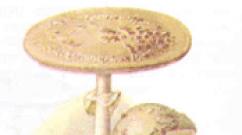Dn Bludov biography. Birth of statesman Dmitry Nikolaevich Bludov
Count Dmitry Nikolaevich Bludov was born on April 5, 1785 in the family estate of Romanov, Vladimir province. Having received an excellent education at home, at the age of fifteen he began serving in the Moscow archive of the Collegium of Foreign Affairs under the leadership of the famous historian N.N. Bantysh-Kamensky. In 1801, the capable “archival youth” was transferred to St. Petersburg to the College of Foreign Affairs, and in 1807, on the recommendation of N.M. Karamzin, he entered diplomatic work. At first, Dmitry Nikolaevich served as secretary of the Russian embassy in Holland, and in 1810 he became the ruler of the diplomatic office of the commander-in-chief of the Danube Army, Count N.M. Kamensky. Later he was a counselor at the embassy in Sweden. The Minister of Foreign Affairs, Count I.A. Kapodistrias, called him “the pearl of Russian diplomats.” In 1820, D.N. Bludov returned to St. Petersburg and began to think about resigning, since he could not get along with the new minister K.V. Nesselrode.
After leaving the Ministry of Foreign Affairs, Dmitry Nikolaevich in January 1826 became the clerk of the Investigative Commission created in the case of the Decembrists. Based on the investigation materials, he prepared a report to the sovereign “On Malicious Societies,” which was approved by Nicholas I and published in a supplement to Russian newspapers. The report actually served as the basis for the verdict of the Supreme Criminal Court. On July 11, 1826, D.N. Bludov received a new appointment - the emperor's secretary of state, and on November 25 he became a companion to the minister of public education and the chief administrator of affairs of foreign confessions. In 1830, Dmitry Nikolaevich was awarded the Order of St. Anna, 1st degree. Soon he was appointed fellow minister, and in 1832, Minister of Internal Affairs and member of the State Council. For a short time, from February to December 1839, D.N. Bludov held the position of Minister of Justice and Prosecutor General and took energetic measures to improve the work of the department subordinate to him. On December 31, 1839, Dmitry Nikolaevich took the place of his deceased friend D.V. Dashkov - chairman of the department of laws of the State Council and chief manager of the 2nd department of His Imperial Majesty's Own Chancellery. In these responsible positions, Dmitry Nikolaevich’s enormous talent as a statesman was fully demonstrated. In 1842 and 1855, two new editions of the Code of Laws of the Russian Empire were published under his editorship, and in 1845 the Code on Criminal and Correctional Punishments was prepared. Understanding the need for radical reforms of the judicial system, D.N. Bludov began preparations for the reform back in the 40s. A huge amount of factual material was collected, which was subsequently used by the drafters of the Judicial Charters. He took part in the preparation of documents for the Peasant Reform of 1861, and on February 19, already in the rank of Chairman of the State Council and the Committee of Ministers, he signed the acts on the liberation of peasants from serfdom. In 1855, D.N. Bludov became President of the Imperial Academy of Sciences. The intense work of the actual Privy Councilor D.N. Bludov was generously rewarded by the sovereign. In 1842 he became a count, and in 1845 he received the Order of St. Andrew the First-Called as a reward (two years later he was also awarded the diamond badge of this order). In 1851, Nicholas I “granted” him a ring with diamonds, and in 1852 - his own portrait with diamonds to wear in his buttonhole. In 1856, the new Emperor Alexander II presented him with his portrait with diamonds to wear on St. Andrew’s ribbon.
From his youth, Dmitry Nikolaevich was engaged in literary creativity: he wrote articles, critical analyzes, even epigrams. He was a keen connoisseur of literature and had great taste. Many were afraid of his wit. He was one of the founders of the Arzamas literary society. Throughout his life he maintained contacts with many famous poets and writers. V.A. Zhukovsky wrote to him: “You are a friend and brother of the singer Lyudmila, you were a friend of Karamzin.”
Count D.N. Bludov died on February 19, 1864 and was buried in the cemetery of the Alexander Nevsky Lavra. Dmitry Nikolaevich Bludov was married to Princess Anna Andreevna Shcherbatova and had a large family. One of his daughters, Antonina Dmitrievna, achieved fame as a writer.
Bludov Dmitry Nikolaevich Bludov, Dmitry Nikolaevich, Count - statesman(1785 - 1864). He came from a very old noble family. Under the guidance of his mother, a woman of outstanding intelligence, energy and high moral qualities, Bludov received an excellent education at home. In 1800, Bludov entered service under the command of Bantysh-Kamensky in the Moscow Archive of the Collegium of Foreign Affairs, where he moved among the “archive youths” fleeing the common noble career of military service; Of these, Bludov especially became friends with Dashkov, and through him he met and subsequently became friends with Zhukovsky. Upon the accession of Emperor Alexander I to the throne, Bludov went to serve in St. Petersburg, in the Collegium of Foreign Affairs. Together with the best part of the St. Petersburg youth, he was keen on the liberal direction of the young emperor and welcomed the proposed reforms. In 1807, Bludov received his first diplomatic mission to Holland to King Louis Bonaparte. In 1810, Bludov was appointed ruler of the diplomatic office of Count Kamensky, who commanded the Danube Army during the Turkish War. He later held diplomatic posts in Stockholm and London. Count Kapodistrias gave Bludov instructions to acquaint the foreign press with the real state of affairs in Russia and, through English newspapers, to defend our policy from attacks by the foreign press. Bludov became an ardent admirer of Kapodistrias and his political system: he shared his negative attitude towards the Holy Alliance and towards Metternich, did not believe in Austrian friendship, saw in Austria our natural rival in influencing Balkan affairs. Together with Russian public opinion, Bludov stood for Russian intervention in the Greek struggle against Turkey. Kapodistrias called Bludov “the pearl of Russian diplomats.” Upon returning from England, Bludov worked on the translation and publication of “Documents for the history of diplomatic relations between Russia and Western powers 1814 - 1822." In this work, he had to develop the Russian diplomatic language for the first time. With the resignation of Kapodistrias, Bludov's diplomatic career ended. In 1825, Emperor Nicholas I, at the direction of Karamzin, appointed Bludov as clerk of the Supreme Commission of Inquiry on the case of December 14. For Bludov This was not an easy task, since many of the Decembrists were well known to him. The “report on secret political societies” he compiled served as material for the verdict. supreme court. This work of Bludov caused an interesting literary controversy: the Decembrist emigrant Nikolai Turgenev, in the book “La Russie et les russes,” sharply condemns Bludov for the criminal frivolity and legal blunders of the report. Before publishing his book about Russia, Turgenev sent Bludov excerpts from it, asking in a letter to refute the accusations or, in any case, to explain himself. Bludov left this letter unanswered. After Bludov's death, his friend and biographer, Yegor Kovalevsky, came out in defense of Bludov's memory from these attacks. Turgenev published his “Answers” to Kovalevsky’s book, in which new strength repeats his accusation. At the end of the case about the Decembrists, Bludov was appointed secretary of state and comrade of the minister of public education. In 1827, he drew up a decree on the non-admission of children of serfs to educational institutions. In 1828, Count Lieven was appointed Minister of Public Education (in place of Shishkov), and the main administration of affairs of foreign religions passed to his comrade Bludov. In this new position, Bludov, at the direction of the sovereign, became close to Joseph Semashko and together with him prepared the reunification of the Uniates with Orthodox Church. Since 1832, Bludov managed the Ministry of Internal Affairs, in 1837 he was appointed Minister of Justice, in 1839 - the chief manager of the II department of His Majesty's Own Chancellery, a member of the State Council and chairman of the department of laws. In 1842 he was granted the dignity of count. Under the editorship of Bludov, the II Department published two editions of the Code of Laws (1842 and 1857). In 1845, the “Code on Punishments” compiled by Section II was promulgated. In his quest to transform civil justice, Bludov encountered stubborn resistance from the Minister of Justice, Panin, who adhered to “historically proven practice.” With the new reign, 70-year-old Bludov, a loyal employee of Nicholas I, succumbed to the new transformative direction of the government. In 1857, drafts of new judicial statutes, criminal and civil, and the statute of the judicial system were drawn up, but after the liberation of the peasants, judicial reform was broader and transferred to other hands. Since 1857, Bludov participated in the preparation of peasant reform. In 1859, he opposed the strengthening of censorship strictures, speaking out against “constraints on the mental development of the country.” In 1861 - 1862 Bludov chaired the State Council and the Committee of Ministers. IN government activities Bludov is difficult to point to one direction that has been accepted. He always surrendered to the prevailing mood and changed his views according to the views of the government. He was always in the service only as an honest and talented executor of the supreme will. In his youth, Bludov took an active part in the literary movement early XIX V. The famous "Arzamas" got its name from Bludov's satirical article "Vision in Arzamas". In Voeikov's humorous "Parnassian address-calendar" Bludov is designated as "the state secretary of the god Taste in separating good works from meaningless ones and branding the latter with the seal of rejection." Almost all the main works of art of that era were read in Bludov's house in manuscripts. Vyazemsky in his message greets Bludov this way: “You are the friend and brother of the singer Lyudmila, you were Karamzin’s friend.” In the name of this old friendship, Bludov published the last, unfinished volume of Karamzin’s “History” and was in charge of the publication of Zhukovsky’s posthumous poems. Surrendering completely public service Bludov did not have leisure for literary work. All that remains of him are a few historical notes (on behalf of Emperor Nicholas, he developed some archival documents) and the brochure “The Last Hours of the Life of Emperor Nicholas I.” Bludov was considered an excellent stylist in his time; he was often tasked with drafting manifestos. In 1855 he was appointed president of the Academy of Sciences and retained this position until his death. - See Kovalevsky, “Bludov and His Time”; "Notes of Count Antonina Dmitrievna Bludova" ("Russian Archive", 1872 - 1875); Wiegel's Notes; Dylevsky, "Joseph Semashko"; Tourgueneff, “La Russie et les russes” and “Responses to Chapter IX of Kovalevsky’s book and to the article “Russian Invalid”; “Speech of the President of the Academy of Sciences at the meeting on December 23, 1855”; “Great meeting of the Academy of Sciences on December 29, 1864.” ; B. Dzhanshiev, “The Age of Great Reforms”; “The Age and Judicial Reform”; “Russian Biographical Dictionary”.
Biographical Dictionary. 2000 .
See what “Bludov Dmitry Nikolaevich” is in other dictionaries:
Russian statesman, count (since 1842). Nephew of the poet G. R. Derzhavin. He was promoted thanks to his participation in 1826 in the Supreme Commission of Inquiry in the case... ... Big Soviet encyclopedia
- (1785 1864) count (from 1842), Russian statesman. One of the founders of Arzamas. In 1832 38 Minister of the Interior. In 1839 62, the chief administrator of the Second Department, led the development of the Code of Punishments (1845). In 1855 the 64th President... Big Encyclopedic Dictionary
Wikipedia has articles about other people with this surname, see Bludov. Dmitry Nikolaevich Bludov ... Wikipedia
Pseudonym under which he writes politician Vladimir Ilyich Ulyanov. ... In 1907 he was unsuccessful as a candidate for the 2nd State Duma in St. Petersburg.
Alyabyev, Alexander Alexandrovich, Russian amateur composer. ... A.'s romances reflected the spirit of the times. Like Russian literature of that time, they are sentimental and sometimes sugary. Most of them are written in minor key. They are almost no different from Glinka’s first romances, but the latter has stepped far forward, while A. remained in place and is now outdated.
The filthy Idolishche (Odolishche) is an epic hero...
Pedrillo (Pietro-Mira Pedrillo) is a famous jester, a Neapolitan, who at the beginning of the reign of Anna Ioannovna arrived in St. Petersburg to sing the roles of buffa and play the violin in the Italian court opera.
Dahl, Vladimir Ivanovich
His numerous stories suffer from a lack of real artistic creativity, deep feeling and a broad view of the people and life. Dahl did not go further than everyday pictures, anecdotes caught on the fly, told in a unique language, smartly, vividly, with a certain humor, sometimes falling into mannerism and jokeiness.
Varlamov, Alexander Egorovich
Varlamov, apparently, did not work at all on the theory of musical composition and was left with the meager knowledge that he could have learned from the chapel, which in those days did not at all care about the general musical development of its students.
Nekrasov Nikolay Alekseevich
None of our great poets has so many poems that are downright bad from all points of view; He himself bequeathed many poems not to be included in the collected works. Nekrasov is not consistent even in his masterpieces: and suddenly prosaic, listless verse hurts the ear.
Gorky, Maxim
By his origin, Gorky by no means belongs to those dregs of society, of which he appeared as a singer in literature.
Zhikharev Stepan Petrovich
His tragedy “Artaban” did not see either print or stage, since, in the opinion of Prince Shakhovsky and the frank review of the author himself, it was a mixture of nonsense and nonsense.
Sherwood-Verny Ivan Vasilievich
“Sherwood,” writes one contemporary, “in society, even in St. Petersburg, was not called anything other than bad Sherwood... comrades in military service They shunned him and called him by his dog name “Fidelka”.
Obolyaninov Petr Khrisanfovich
...Field Marshal Kamensky publicly called him “a state thief, a bribe-taker, a complete fool.”
Popular biographies
Peter I Tolstoy Lev Nikolaevich Catherine II Romanovs Dostoevsky Fyodor Mikhailovich Lomonosov Mikhail Vasilievich Alexander III Suvorov Alexander Vasilievich
, Russian historical dictionary
BLUDOV Dmitry Nikolaevich (04/5/1785-02/19/1864), statesman. He came from a noble noble family, descended from Iveshchei Blud, a governor. book Yaropolk. Bludov was brought up under the exclusive influence of his intelligent and educated mother, who remained a widow for the sake of her son. He was taught by the best teachers in Moscow. Distinguished by his extraordinary memory, he quickly grasped the material and mastered it perfectly. foreign languages . Rapprochement with the families of Field Marshal M.F. Kamensky and Prince. M. M. Shcherbatova had a great influence on Bludov’s life. In 1800 he entered the Moscow Archive of the Collegium of Foreign Affairs. Here he quickly advanced thanks to his knowledge and abilities, began to participate in the publications and translations of collections of diplomatic articles, became friends with the brothers A.I. and N.I. Turgenev and D.V. Dashkov; Through the latter I met V. A. Zhukovsky. In 1802, with the accession of Alexander I and the beginning of new trends and reforms, Bludov moved to St. Petersburg. Continuing his service in the Collegium of Foreign Affairs, he began to carry out increasingly important assignments: in 1807 he traveled to Holland, then headed the diplomatic chancellery under the Danube Army of N. M. Kamensky; in 1812 he stayed for approx. year as mission adviser in Stockholm. All this time his interests fluctuated between diplomacy and literature; the latter occupied him so much that at one time he decided to retire and devote himself exclusively to it, but under the influence of his mother he remained in the service. In St. Petersburg, Bludov met the writers G. R. Derzhavin, V. A. Ozerov, N. M. Karamzin and others. After the war of 1812-15, when interest in literature again captured Russian society, Bludov plunged into the struggle of literary parties, joining Karamzin's school and Zhukovsky's circle. In contrast to Shishkov’s “Conversations of Lovers of the Russian Word,” Bludov with Zhukovsky, Uvarov and Dashkov created their own society “Arzamas,” which met at Bludov’s apartment. Shortly before the collapse of Arzamas, Bludov was appointed adviser to the embassy in London, where, in addition to his direct duties, he monitored the English press, which was attacking Russia. The illness forced Bludov to return to his homeland in 1820. At this time, he was closely involved in the publication of diplomatic acts. With the accession of the Emperor. Nicholas I Karamzin recommended Bludov and Dashkov to him as valuable employees. In 1826 Bludov was appointed clerk of the Supreme Commission of Inquiry into the Decembrist case. He had to bring charges against people with many of whom he had friendly relations. This heavy duty caused sharp attacks on Bludov from the freemason N. I. Turgenev in the book “Russia and the Russians.” In 1826 Bludov became Secretary of State, comrade of the Minister of Public Education and chief administrator of foreign confessions; was engaged in the organization of the Greek-Uniate Church. In 1830 he managed the Ministry of Justice instead of Minister Dashkov; in 1832-37 he was Minister of the Interior; from 1837 he headed the Ministry of Justice for two years, in 1839 he was appointed a member of the State Council, chairman of the Department of Laws and the Second Branch of His Imperial Majesty's Own Chancellery. In 1842 he received the title of count. Under his editorship, 2 editions of the Code of Laws were published; he was also the main participant in the drafting of the Penal Code of 1845.
The reformation period of Alexander II found Bludov already in his old age. In 1855, at the age of 70, Bludov was elected president of the Academy of Sciences, chairman of the Jewish and orphanage committees. From 1857 he was a member of the committee to consider regulations on serfdom. Soon after the liberation of the peasants, Bludov was appointed chairman of the State Council. Under his chairmanship, the State Council approved the regulations on zemstvo institutions and judicial statutes. Of the literary works, the most outstanding is the publication of the last volume of Karamzin’s “History of the Russian State” based on the author’s drafts, “The Last Days of the Life of Emperor Nicholas I.”
BLUDOV, noble family. The ancestor, according to family legend, is Blud Iveshchey (Jonah), a boyar and governor of Kyiv. book Yaropolk Svyatoslavich. Later the offspring split into several branches. The later Bludovs considered their direct ancestor Fyodor Bludov, who left for Rus' from Lithuania in the middle. XV century, from which successive generations of painting begin. Feodor's grandson Boris Semenovich Bludov went as ambassador to Crimea in 1528. In the XVI-XVII centuries. The Bludovs served as governors, solicitors, and Moscow nobles (see: Nobility).
President of the Academy of Sciences, Chairman of the State Council; genus. April 5, 1785 in the family estate of Romanovka (Vladimir province, Shuisky district), d. in St. Petersburg on February 19, 1864. By the time of the birth of Dimitri Nikolaevich, the Bludov family was one of the ordinary noble families. D.N. Bludov lost his father while still a child; His upbringing was entirely in charge of his mother, Ekaterina Ermolaevna, from the Tishin family. Home education left a very definite imprint on Bludov. A free life in the village developed in him a love of nature and thus, to some extent, prepared the ground for the perception of sentimental trends so characteristic of the literary movement of the early 19th century. Derzhavin's nephew and Ozerov's cousin, Bludov was close to the literary circles of his time from childhood. Acquaintance with languages helped him enrich himself with information in the field foreign literature : he knew not only new languages, but also ancient ones. Having experienced in childhood the strong influence of one of his tutors, the emigrant Comte de Fontel, Bludov combined his admiration for the educational philosophy of the 18th century with an exclusively negative attitude towards the French Revolution. The aristocratic feeling was strong in him from childhood, and in the future he was being prepared for the type of figure of an enlightened, but conservative way of thinking. Bludov's service begins on July 3, 1800 in Moscow, where his mother had moved by that time and where in those days everyone who left St. Petersburg with the beginning of the reign of Emperor Paul I gathered. Bludov entered the Moscow archives of the Ministry of Foreign Affairs as a cadet, the only place at that time where it was possible to begin civil service, which explains the influx of many young people with big names here. Bludov got into the archive thanks to the assistance of Field Marshal Kamensky, who lived in Moscow at that time and with whose wife Dmitry Nikolaevich’s mother was very friendly. Serving under the leadership of Bantysh-Kamensky, Bludov met here with Vigel, Andrei and Alexander Turgenev, Dashkov - those “archival youths” who made an honorable name for themselves in the history of Russian science; This was supplemented by his rapprochement with Batyushkov, Zhukovsky, and somewhat later with Karamzin. One of Bludov’s first literary works dates back to this time - the translation “On Alliances Concluded Between States,” which was included in the “Diplomatic Articles Translated at the Moscow Archive by Serving Noble Young Men in 1802, 1803, 1804 and 1805 under the supervision of Senior Soviets . Alek. Malinovsky" (remained in the manuscript). - In 1802, Bludov moved to St. Petersburg, and here his more active service began, first in the collegium, and then in the Ministry of Foreign Affairs, which then, due to the frequent absence of the minister, gr. Rumyantsev, was actually controlled by his comrade - gr. Saltykov. At first, however, the service required so little work from Bludov that he began to get bored from inactivity and thought about retiring completely in order to devote himself entirely to literary activity. Only four years later Saltykov paid attention to the capable young man and began to give him more serious assignments. So, on October 18, 1808, Bludov was sent to Holland to present King Louis, who was striving to get closer to Russia, with the Order of St. Andrew the First-Called; upon his return from Holland, he took over the post of ruler of the diplomatic chancellery of Count Kamensky, commander-in-chief of the Danube Army (at the beginning of 1810. ). In 1812, Bludov married Princess Shcherbatova and after that, on September 13, he was appointed adviser to our mission in Stockholm, and the following year he was made chargé d'affaires at the Swedish court. Here he successfully opposed the French party and took care of Bernadotte's rapprochement with Russia. Bludov's acquaintance with the famous French emigrant Madame de Stael dates back to this time. In 1814 he returned to St. Petersburg.
The beginning of Bludov's service thus coincides with the time of struggle in our society and official spheres of two directions - progressive, encouraged by the initiatives of Alexander I, and conservative, whose representatives welcomed the new reign only as a return to the policy of Catherine II. Bludov definitely took the side of the first of the two named directions; in his earliest letters a sharp note is sounded against people of the old school; he is faithful to his sympathies both in the days of the undivided influence of the “secret committee” on our public life, and in the days of the fall of Speransky. But Bludov’s sympathies were reflected not so much in his official activities as in his attitude towards modern literary parties. When, after a temporary reconciliation in a year Patriotic War and the general enthusiasm in the days of the capture of Paris, when the opponents again came face to face, we see Bludov as one of the founders of Arzamas, a society in which the literary enemies of Shishkov rallied, who saw them as almost political enemies of Russia. “Arzamas” received its very name from Bludov’s satirical work “Vision in Arzamas”. Until the end of Arzamas's existence, Bludov remained an active member of it; he bore the pseudonym "Cassandra" here; Zhukovsky dedicated the second part of his “Sleeping Maidens” to him. The year Bludov left for England (1817) coincides with the beginning of the extinction of the Arzamas. While instilling noble feelings in its participants, Arzamas remained, however, a purely literary circle that did not pursue the achievements of any social reforms. The younger generation shows a preference for public interests; the means by which it tries to achieve the realization of its ideals are sharper and more decisive than the essentially harmless epigrams of the Arzamas people. The days of "Arzamas" are passing, the days of the "Union of Welfare" are coming, and somewhat later - the Northern and Southern Secret Societies. In parallel with this, the protective direction in Russian politics is increasingly intensifying, which later, thanks to revolutionary movements, turned into reaction. Not sympathizing not only with the means, but also with many of the views of his younger contemporaries, Bludov, however, remained an enemy of reaction, but great caution and, perhaps, even flexibility in everything that related to practical life allowed him to occupy such a position among hostile parties , which did not in any way interfere with the successful continuation of his career. From the end of 1817 to 1820, Bludov was first an adviser to our embassy, and then a charge d'affaires in London, where, among other things, he was entrusted with the responsibility of monitoring the English time press and refuting rumors unfavorable for Russia that appeared in it. Upon returning to Russia, Bludov was tasked with translating many political acts into Russian, which was in connection with the Emperor’s desire to gradually introduce the Russian language into diplomatic correspondence. The result of this was the publication of “Documents for the history of diplomatic relations between Russia and the Western European powers from the conclusion of universal peace in 1814 to the Congress in Verona in 1822.” On July 31, 1822, Bludov was seconded, by Imperial command, to the Ministry of Internal Affairs for Bessarabia.
Until now, the very area in which Bludov’s official activities took place allowed him to remain aloof from questions domestic policy. Circumstances turned out differently during the new reign. Emperor Nicholas, who came to the throne unexpectedly for himself, had difficulty choosing employees and turned to Karamzin for advice, who pointed him to several reliable people, including Bludov. From then on, his rapid rise and participation in the most serious state affairs began. Bludov’s first step in this field was to participate as a clerk in the Supreme Commission of Inquiry, which tried the Decembrists, among whom there were many people close to him personally. N. I. Turgenev in the famous book “La Russie et les Russes” sharply condemns Bludov’s behavior in this commission, attributing to him to a large extent the severity of the final verdict of the trial of the Decembrists, but E. P. Kovalevsky quite successfully refutes Turgenev. The notes of other Decembrists say almost nothing about this aspect of Bludov’s activities. Apparently, he felt how slippery his position in the commission was, and in order to get out of the difficulty, he avoided any active participation in the investigation and limited himself to playing the role of a conscientious recorder.
At the end of the work of the investigative commission, Bludov was appointed Secretary of State, on November 25, 1826 he took the post of Comrade Minister of Public Education, in 1827 he was entrusted with managing the affairs of the committee on abuses in the supply of ship scaffolding, and on April 25, 1828 - the main department spiritual affairs of foreign confessions. In this last position, he had to face the question that had come to the forefront at that time about the conversion of Uniates to Orthodoxy. Partly the humane traditions of the bright half of the previous reign, partly Bludov’s personal caution and dislike for decisive measures forced him on this issue to side with the opinion of Metropolitan Joseph Simashko, who stood for gradual and meek measures and found that it was impossible to “suddenly redo what the Poles had achieved in for more than 200 years." Bludov's views on this issue found an opponent in the person of Muravyov, whose opinion ultimately triumphed; but Bludov’s opposition was expressed in such cautious forms that the triumph of opposing views did not undermine his official position. On December 6, 1828, Bludov was granted privy councilor status. From the end of July 1830 to January 1831, in addition to his other duties, he managed the Ministry of Justice in the absence of Minister Dashkov. Around the same time, by order of the Highest, he reviewed several tens of thousands of the most important archival documents , scattered across different storage facilities, mostly located in His Majesty’s Office. The value of these documents for future historians was fully understood by Bludov, and he concentrated them in the State Archives. On January 13, 1831, Bludov was awarded a very flattering Highest Rescript for the zealous fulfillment of all the assignments assigned to him, and in the same year he was appointed a member of the committees for the affairs of the Kingdom of Poland (August 19) and the Western provinces (in September). On February 12, 1832, Bludov was appointed Minister of the Interior and managed this department until 1838. During this time, in addition to performing his direct duties, he sat on various committees, among other things, on the issue of admitting people of unfree conditions to educational institutions and on the consideration of the Kiselevsky project on the management of state property, and from May 24 to September 17, he again managed the Ministry of Justice, while remaining the Minister of Internal Affairs. On February 15, 1838, Bludov was confirmed as Minister of Justice, and on February 14, 1839, he was promoted to actual Privy Councilor and awarded the gracious Highest Rescript for his activities in managing the Ministry of Internal Affairs. Already on December 31 of the same year, Bludov's new appointment followed - chief manager of the II department of His Majesty's Own Chancellery, member of the State Council and chairman of the department of laws. The assignment of the II department to Bludov, in which the matter of codification of laws was concentrated, is explained by the personal trust of Emperor Nicholas I in Bludov, who looked at him as a successor to Speransky. Bludov's tenure as chief administrator of the office was the longest in time (until 1862) and the most fruitful period of his activity. This period dates back to his editing of two editions of the Code of Laws (1842 and 1857) and the publication of the Code of Punishments, which represented a significant step forward compared to the previous state of Russian legislation (1845). Complex work on the II department did not prevent Bludov from carrying out many other responsibilities on various committees and institutions. Already on January 2, 1840, he was ordered to be present in the Department of Affairs of the Kingdom of Poland in the State Council and, in the absence of the chairman, to take his place; then he was appointed to the committees: on the delimitation of provinces, on the organization of the Transcaucasian region, on providing for the rural clergy, and on the Jewish one. Bludov's zealous and long-term service was rewarded on April 18, 1842. elevating him to the hereditary dignity of count. In 1847, as an authorized representative, he negotiated with the pope and concluded a concordat, in which, according to the Highest rescript addressed to Bludov, “the proper development was given to the principles laid down during the meeting of His Majesty with the pope, and the basic regulations for the management” of the Roman Catholics were approved churches in the Empire and the Kingdom of Poland.
Emperor Alexander II continued to place his unwavering trust in Bludov. On November 25, 1855, he was appointed president of the Academy of Sciences, on August 30, 1856 - chairman of the Jewish Committee, on March 8, 1857 - chairman of the committee on orphanages, and finally, on January 1, 1862, he was confirmed as chairman of the State Council and the Committee of Ministers (he already carried out these last duties in 1861). - The liberation initiatives of Alexander’s reign evoked the most sympathetic attitude on the part of Bludov. Already from August 1857, he took an active part in the committee to consider decisions and assumptions about serfdom in Russia, and in the Highest Rescript of April 23, 1861, he was expressed royal gratitude for his work in this field. In addition, as the chief administrator of the II department, Bludov could not stay away from the issue that arose about the transformation of our judicial institutions. In 1857, he submitted to the Emperor a “Note on Judicial Rulings,” where he directly stated that “we especially cannot even think about any improvement in this part of our legislation, without changing its very basic idea, without adopting not only different, but to a certain extent, principles that are contrary to her." He demanded the complete abolition of class courts, the separation of judicial and administrative powers, the removal of the police from the investigation, increased publicity, the weakening of the theory of legal evidence, the introduction of orality in the process and the establishment of the institution of sworn attorneys. The opinions expressed by Bludov in this “Note” had, in essence, formed for him a long time ago and were expressed by him more than once, although with greater caution, after the publication of the new Criminal Code of 1845. The final development of judicial reform did not belong to Bludov: from the time of his appointment Chairman of the State Council, he almost completely withdrew from this matter. - Bludov’s last occupation was taking care of the organization of public education, and mainly women’s education in the Western Territory. The establishment, on the initiative of his daughter, Countess Antonida Dmitrievna, of the Ostrog Cyril and Methodius Brotherhood and the establishment of a higher women's school with it in 1866 is the implementation of the dying thought of Count Dmitry Nikolaevich.
Being in close relations with many literary circles of his time, Bludov himself took a relatively insignificant active part in literature. During his lifetime, his essay “The Last Hours of the Life of Emperor Nicholas I” (St. Petersburg, 1855) was published, soon translated into French, German, English and Polish. After his death, his following works (mostly of a historical nature) were published: 1) “The Trial of Count Devier and his accomplices.” 2) “About impostors who appeared under Catherine II in the Voronezh province.” 3) "Benovsky's riot in the Bolsheretsky prison." 4) "Menshikov's Day Notes." 5) "Opinion about two notes by Karamzin." 6) “Thoughts and comments” (all in the appendix to the book by E.P. Kovalevsky “Count Bludov and his time”, the latter - later separately). In addition, Bludov took an active part in the final processing and publication of the XII volume of Karamzin's History, and later, in the late fifties, in the publication of the works of Zhukovsky by the Academy of Sciences. Finally, interesting notes remained after Bludov, but they have not yet been published.
B. P. Kovalevsky, “Count Bludov and his time.” - S. Vengerov, “Dictionary” (there is a complete bibliography here). - Munster, "Portrait Gallery of Russian Figures." - N. Tourgueneff, "La Russie et les Russes". - G. Dzhanshiev, “The Age of Great Reforms” and “S. Zarudny and Judicial Reform.” - Dylevsky, "Joseph Simashko". - Bludov’s letters and correspondence with him from various persons were published repeatedly in the Russian Archive and other publications.
(Polovtsov)
Bludov, Count Dmitry Nikolaevich
Statesman; genus. On April 5, 1785, in the Shuisky district of Vladimir province, on his family estate, he lost his father in infancy, was raised under the supervision of his mother, moved with her to Moscow, where in 1800 he entered the service of the archive of foreign affairs, but soon moved to foreign collegium in St. Petersburg and here he became close friends with Karamzin, Zhukovsky and other outstanding our writers. His relationship with Karamzin was especially close. Karamzin and Bludov mutually complemented each other: the first never stepped out of the modest role of a writer, but had enormous influence on state affairs; the second never left his career, but in the direction of his studies, in his erudition and enormous memory, in his inclinations, he had all the makings to become a brilliant writer. And although he never fully devoted himself to this calling, he took an active part in the literary movement of the era of his youth, a brilliant and seething era. new life. In the first two decades of this century, we find him in the ranks of that phalanx of young writers who, under the banner of Karamzin, fought with the weapon of irony against the extremes of the Shishkov school. B.'s name is closely connected with the origin and activities of Arzamas (see). But actually the letter. His activities were casual. Having entered the diplomatic field early, he limited his participation in literature to close relations with young writers of the Karamzin circle, who, trusting his subtle taste and extensive knowledge, often turned to him for advice. But with such relations with the best representatives of our literature of that time, he, of course, himself was constantly under beneficial effects this chosen society. This influence was subsequently joined by B.’s stay in the diplomatic service in Sweden and England, two countries where public morals are imbued with the idea of respect for the law and for civil liberty ; in England, where B. stayed for more than two years (1817-20), first as an adviser to our embassy, and then as a chargé d'affaires, he closely followed the direction of English and American journalism. Upon returning to his homeland, B. was engaged in collecting and translating documents for the history of diplomatic relations between Russia and the Western powers. Literary connections, which had an undoubted influence on his character, also gave the final direction to his career. In this regard, Karamzin plays a particularly important role in his fate; it is known that the historiographer, shortly before his death, pointed out B. to Emperor Nicholas as a person worthy of taking a place in the highest state administration. Immediately upon his accession to the throne, Nicholas I appointed B. to the responsible position of clerk of the Supreme Court over those accused in the event of December 14. B.’s activities in this position of clerk of the investigative commission, for which he compiled a general report, were subsequently subjected to sharp attacks by N. Turgenev in his book. "La Russie et les Russes" (Par., 1847); his friend and biographer, E.P. Kovalevsky, refuted Turgenev’s accusations, to which the latter wrote: “Answers. I, to Chapter IX of the book “Count B. and his time by E. Kovalevsky”; II, to the article “Russian. disabled person" about this book" (Paris, 1867). Upon the closure of the commission, B. was granted the position of Secretary of State and in the same 1826 he took the place of Deputy Minister of Public Education and at the same time the Chief Administrator of the Affairs of Foreign Religions. In 1828, regarding the establishment of Greek-Uniate churches in Russia, the emperor expressed his special favor to the hardworking administrator and granted him a position as a Privy Councilor. In 1830, B., for several months in the absence of Minister Dashkov, managed the Ministry of Justice, from 1832 the Ministry of Internal Affairs, from 1837 the Ministry of Justice until December 1839, when, granted the status of actual Privy Councilor, he was appointed chief manager of the II Department of Proper E . I. V. Chancellery, member of the State Council and chairman of its department of laws; from 1840 he was present in the department of affairs of the Kingdom of Poland. Moreover, B. participated in many committees at different times. 18 Apr In 1842 he was elevated to the rank of count. Under the editorship of B. as the chief administrator of the II department, two editions of the Code of Laws were published (1842 and 1857); he was also the main figure in the drafting of the Penal Code of 1845, which, despite all its shortcomings, has one undoubted merit: it largely streamlined the punitive system, created a ladder of punishments and destroyed that absolute uncertainty of punishments that plagued our previous criminal legislation . An important task was the conclusion of a concordat with the Roman Curia, which in 1847 was signed by B. as an authorized representative. During the reign of Alexander II, B. was appointed president of the Academy of Sciences (1855) and the Jewish (1856) and orphanages (1857) committees, and chairman of the State Council and the Committee of Ministers (1862). In the significant era that followed the Crimean War, B. took an active part in the fundamental government reforms of that time. Since 1857, he was a member of the committee to consider decisions and assumptions about serfdom in Russia, and his merits in the great cause of liberation of the peasants were recognized by the highest rescript of April 23, 1861. On February 19, 1864, B. died and was buried in Alexandro - Nevsky Lavra.
In B.'s house, writers always received a particularly warm welcome and found support and advice; Here, even before they appeared in print, the most remarkable works of Russian literature over several decades were read. Of his numerous articles, B. himself published only the brochure “The Last Hours of the Life of Emperor Nicholas I” (St. Petersburg, 1855), which was then translated into the following languages: Polish, German, English and French. He rendered a special service to Russian literature by publishing the last volume of Karamzin, for which K. S. Serbinovich, based on the historiographer’s rough sketches, compiled notes, carefully reviewed by B. He was also the chairman of the commission composed of the book. Vyazemsky, Pletnev and Nikitenko for the publication of posthumous works by Zhukovsky. All his life B. remained a faithful friend of education, in 1848 he saved our universities from closure, and in the last days of his life he was concerned about the fate of our public schools.
The biography of B., which E. P. Kovalevsky began to compile, was completed only until 1826, published under the title “Count B. and His Time” (St. Petersburg, 1866) and is included in the “Collected Works of E. P. Kovalevsky” (SPb., 1871, vol. 1); Attached to it are several historical notes from Count B. and his thoughts and comments, which were also published separately (St. Petersburg, 1866).
(Brockhaus)
Bludov, Count Dmitry Nikolaevich
(1785-1864) - Russian statesman. Having replaced Count Kiselev in the responsible post of chairman of the Jewish Committee in 1856, B. concentrated in his hands the development of Jewish reform and, in general, the resolution of various issues of Jewish life. Not being an opponent of individual legal relief, B. opposed attempts at the complete emancipation of the Jews, and in this regard, his influence on the sovereign and on his comrades on the committee was decisive. B.'s influence on the new legislation on Jews was also reflected in the fact that he considered it possible and necessary to abolish or soften legal restrictions not in relation to the entire Jewish population, but only to “Jews influential in wealth and education.” - As a comrade of the Minister of Public Education, B. petitioned the Emperor in 1828. Nicholas I for the famous writer Isaac B. Levinzon a reward of one thousand rubles (see Art. Emperor Alexander II). - Wed: “Survived”, I, “Attempt to emancipate Jews in Russia”, 162-3; ibid., “Documents and Communications,” 26-27.
(Heb. enc.)
Bludov, Count Dmitry Nikolaevich
(Polovtsov)
Bludov, Count Dmitry Nikolaevich
(1785-1864) - statesman. A typical bureaucrat of the Nicholas reign, educated and capable, but devoid of any originality, excellent at adapting to circumstances, essentially a conservative, but ready to make concessions to “new trends” in small things, B. successfully made his career under a wide variety of circumstances. B.'s official successes began with his appointment as clerk of the investigative commission in the case of the Decembrists (and his activities aroused strong condemnation from N. Turgenev, sentenced in absentia). After that, he quickly advanced, becoming Minister of Justice, then Minister of Internal Affairs (1832-1838). B. played a major role in the drafting of the “Code of Punishments” of 1845, which, however, did not introduce anything new into Russian criminal law. IN recent years B.'s life was chairman of the State Council.
Biographical Dictionary













